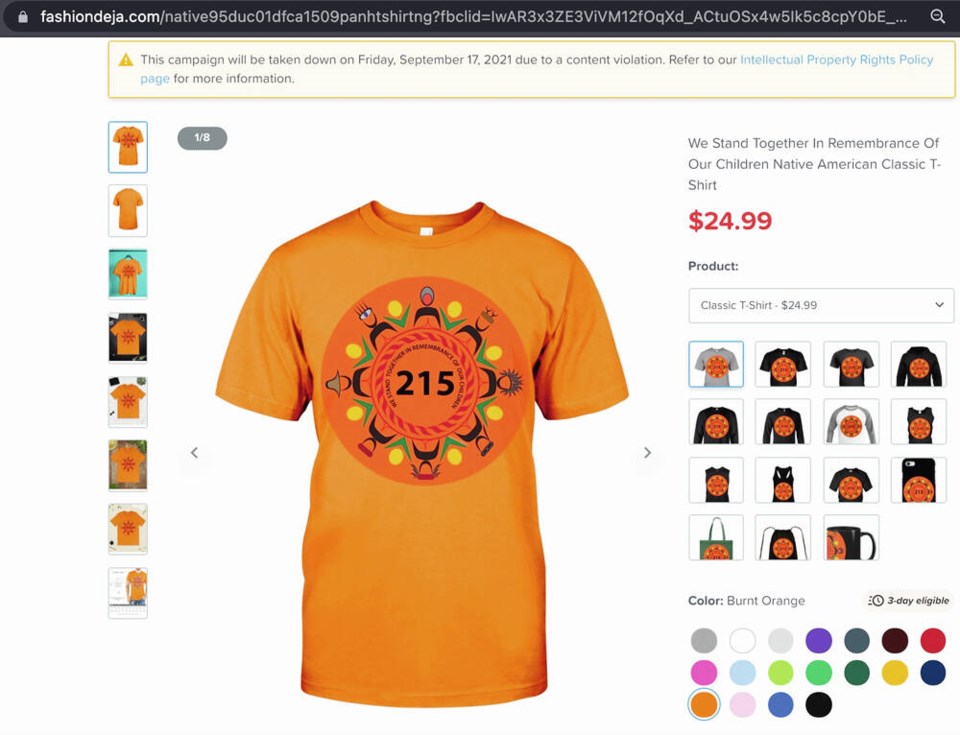A Kwakwaka’wakw artist is calling for better protections for artistic work after her design honouring children who were forced to attend residential schools appeared on clothing and other products sold on a U.S.-based e-commerce website without her permission.
Lou-ann Neel, a survivor of Alberni Residential School, created the design We Stand Together in Remembrance of Our Children — 215 to raise awareness in the wake of the discovery of probable burial sites at the grounds of the former Kamloops Indian Residential School.
The number of sites was first estimated at 215, but later updated to about 200. Potential unmarked burial sites have been found near the grounds of several former institutions since then, including the Kuper Island Residential School on what is now Penelakut Island.
In her description of the piece, Neel said she wanted people to know “there is nothing more powerful than when we stand together. This is a teaching I knew at age six, before I went to residential school. It is what gave me hope when I was immersed in the hopelessness of that place; and it is what gives me strength today as we continue to seek justice.”
So when Neel found her design being used to sell T-shirts, hoodies, tops, phone cases, mugs and tote bags online without her permission, “my blood was just boiling within 30 seconds,” she said.
“I’m really, really disappointed. It breaks my heart to see that this work — you know the work we’re doing to raise awareness — there’s always somebody waiting out there to exploit moments like this. This isn’t even the first company that’s done this,” she said.
Neel said people have been stealing the work of Indigenous artists for decades. It’s something her grandmother fought years ago and artists such as herself continue to deal with today.
Earlier this year, Indigenous artists were upset to discover Every Child Matters logos appearing on clothing advertised online. Fake Indigenous art has also been documented in souvenir shops across Canada, sending profits to those appropriating the art form rather than Indigenous artists.
“People just have this widespread belief that Indigenous art is in the public realm. And it’s not,” she said.
Neel lodged a complaint with the website, fashiondeja.com, and contacted the Canadian Intellectual Property Office, an agency of Innovation, Science and Economic Development Canada, asking for help.
“This company has absolutely no connection to our people, and the money’s just going straight into their pockets. So, you know, I think that’s a real travesty considering we’re already not getting support for our survivors,” Neel said.
The website, which has an address in Indianapolis, Indiana, has posted a note above the products using Neel’s design that says the page would be taken down Friday “due to a content violation.” The note refers to the company’s intellectual property rights policy.
The page remained up as of 4:30 p.m. Friday.
Questions to the website about the products were directed to the copyright team of another e-commerce site called TeeChip, an online platform that Fashiondeja says powers its site.
In an email, they noted the products were already flagged by their system “for a takedown.” They did not answer questions about how the products ended up on the website or why they had not yet been removed, despite being flagged. Fashiondeja’s website claims the artists who create all the work on the site are based at one address in London, England.
Neel said she’s frustrated with Canada’s Copyright Act, which she believes does little to prevent the theft and appropriation of Indigenous artwork.
“It’s just an act that says, you know, hey, don’t steal from other artists. If you do, we’re gonna wag our finger at you. Without regulations, there’s no way to hold people accountable,” she said.
Intellectual property lawyer Stephanie Chong said the Copyright Act protects artistic work, and the person who created the artwork is the first owner of the copyright. Artists do not need to apply for a copyright registration to own their work, Chong said.
Chong said copyright infringement of artists’ work is fairly common, and the simplest and most efficient way to address it is through the online platform directly, because many e-commerce sites have ntellectual property policies.
Owners can sue for infringement of their copyright, often starting the process with a cease and desist letter, which is sometimes enough to resolve the issue, said Chong, a partner at Hoffer Adler law firm in Toronto and current president and board chair of the Intellectual Property Institute of Canada.
However, it’s difficult to prevent work from being copied in the first place.
“There is unfortunately still a very common perception that just because something appears online, it’s free for the taking,” Chong said.
Neal said there needs to be more legal support for artists who find their work being used by others. “We have to hire a lawyer, ourselves. And so this insidious little circle goes. I can’t afford a lawyer because somebody else is busy making my money off of my work.”



